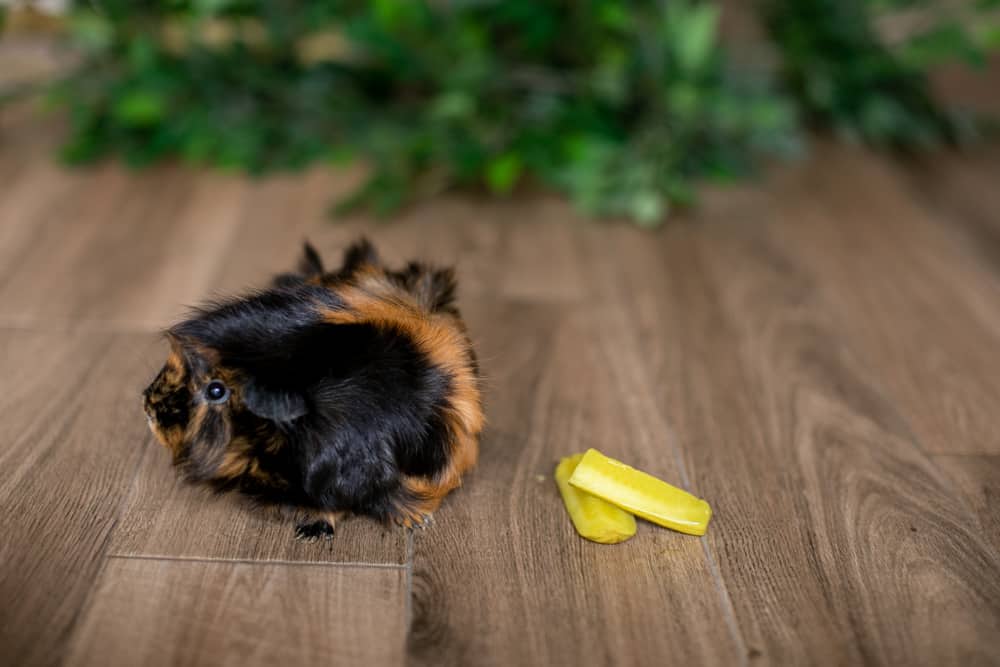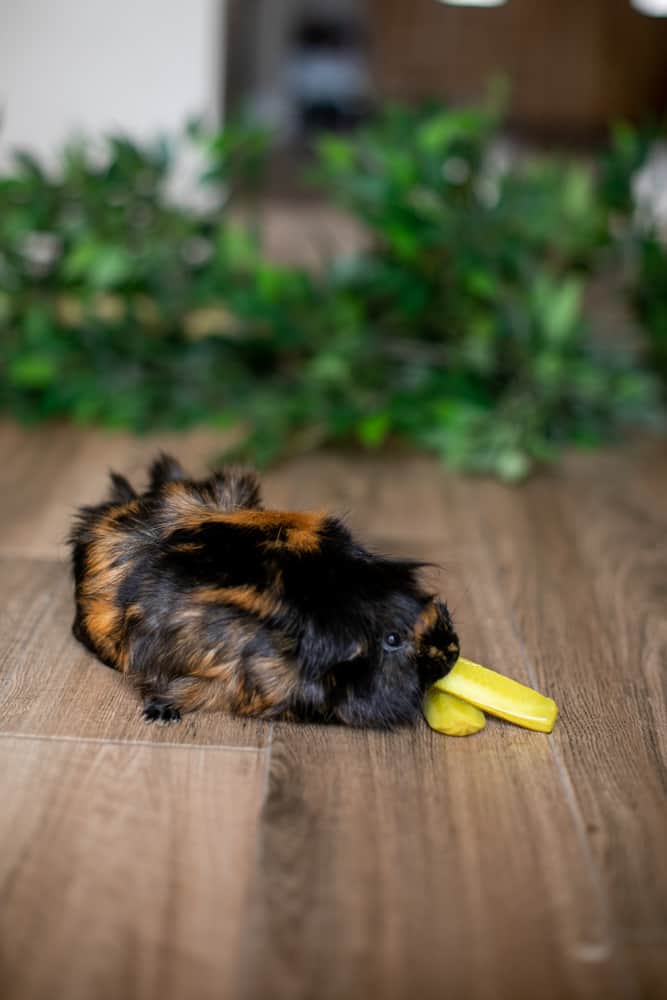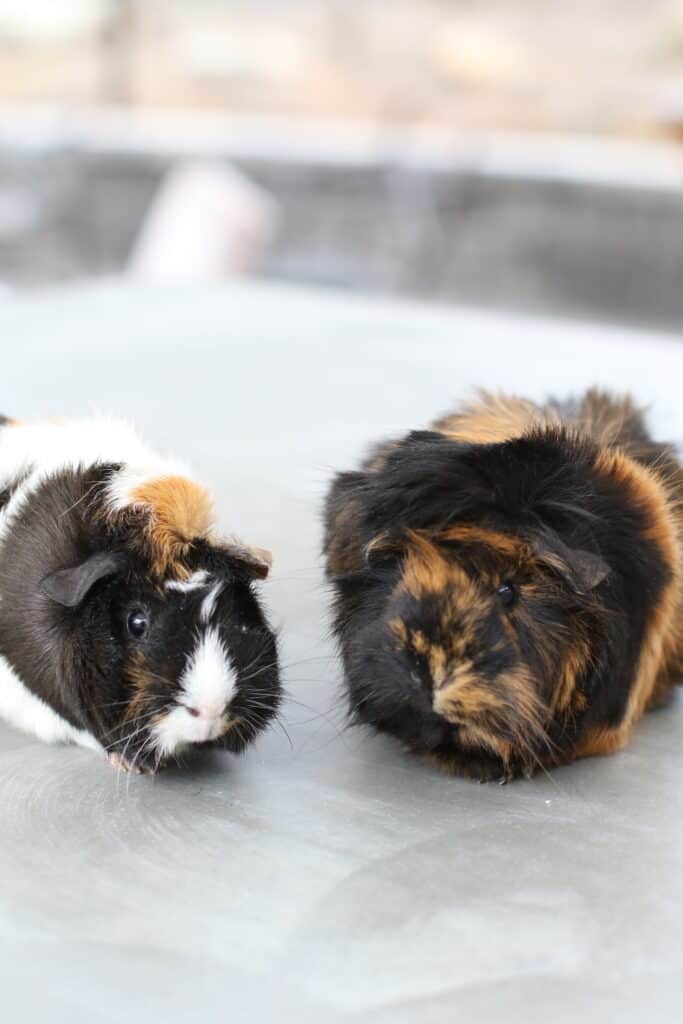As an Amazon Associate we earn from qualifying purchases.
One of the main reasons guinea pigs are so popular pets it’s because they’re low maintenance. However, these charming rodents have a rather sensitive digestive tract, so even if they’re easy to care for, you should pay attention to what you feed them.
Several foods can have severe consequences for them and even lead to their death. Since there’s so little information about this subject, it’s hard to know what guinea pigs can and what they can not. Does that include pickles? Can guinea pigs eat pickles?
Can Guinea Pigs Eat Pickles?
No, guinea pigs can’t eat pickles. Pickles are high in salt and acid, which can cause several problems to your guinea pigs, including bloating, stomach ache, high blood pressure, acid reflux, kidney pain, and even vomiting.

Honestly, pickles have very little to offer in terms of nutrition to your beloved pet. You should feed them fresh grass and vegetables, as well as other foods that are better suited for guinea pigs.
Risks of Feeding Pickles to Guinea Pigs
Marinated vegetables like pickles are bad news for guinea pigs. Since these furry rodents are pretty small, they have tiny organs which can’t bear the high amount of salt and acid that’s in pickles. Exposure to these high amounts of sodium and acid that aren’t suitable for their digestive system can cause severe health problems and even be fatal.

Some of the risks of feeding pickles to guinea pigs include the following:
- Exposure to foods with high sodium content, like pickles, can trigger the production of bladder stones or hard mineral masses in the bladder. Side effects include abdominal pain, blood in urine, and frequent urination.
- Additionally, foods with high sodium content, like pickles, can cause high blood pressure and bloating in guinea pigs. Pickles are salted and promote water retention in these domestic rodents causing these issues to occur.
- Vinegar in pickles can cause gastrointestinal problems in guinea pigs. Ultimately, these can lead to renal calculus, which results in blood passing in the urine and pain in the groin.
- In some cases, foods like pickles can induce vomiting in guinea pigs.
Food Poisoning Symptoms in Guinea Pigs
If you’re concerned that your guinea pig is suffering from food poisoning after feeding them pickles or any other similar food, you should look out for the following symptoms:
- Nausea
- Vomiting
- Diarrhea (may be bloody)
- Fever
- Drooling
- Dizziness
- Shivering
- Lack of energy
- Abdominal pain
- Lack of appetite
If you noticed any of these sings in your guinea pigs, don’t hesitate to contact your veterinarian immediately, along with feeding your pets the right foods for them, it’s the best way to keep them from suffering any serious health problems.
Ideal Diet to Ensure Healthy Guinea Pigs
The primary dietary supplement of a guinea pig is hay which is vital for their digestive health. Hay consists of fiber, which is also present in eggplants, and roughage. It prevents obesity and diarrhea.
Did you know that guinea pigs have teeth that grow continuously? Why does this have to do with hay? Munching on hay helps grind the teeth and prevent dental issues. Ideally, guinea pigs should mostly rely on hay for their dietary needs.
It is also advisable to serve your guinea pigs with high-quality grass-based guinea pig pellets. You can easily find pellets explicitly made for guinea pigs in any pet store. Since guinea pigs have specific dietary requirements, it is essential to give these pellets according to the instructions on the label.
Finally, please don’t forget to give the guinea pigs a healthy serving of leafy greens such as celery, lush vegetables, and weeds. According to the Humane Society, these furballs need a cup of vegetables every day. So choose your guinea pig’s meal wisely.

Related Questions
Are Guinea Pigs Herbivores?
Guinea pigs are herbivores that rely on hay, grass, pellets, and vegetables to thrive. In their natural habitats, these rodents are known to hang out in small herds, looking for something that they fancy enough to forage.
Can Guinea Pigs Eat Kosher Dill Pickles?
Guinea pigs eat dill and dill stems, but they do not consume kosher dill pickles, which are marinated and hence unsuitable to consume. In addition, Dill pickles have too much citric acid and sodium and can prove to be harmful to the rodent.
What Happens if a Guinea Pig Eats a Pickle?
If the guinea pig consumes a pickle, it might face digestive issues. The rodent can end up experiencing stomach aches, vomiting, passing blood in the urine, or urinating more frequently than usual. If you observe these symptoms, it is best to rush to the nearest veterinarian.
Conclusion
Guinea pigs have not adapted to consume pickles which are too acidic, spicy, and salty for them. Guinea pigs need their fair share of nutrients to flourish and be healthy. It’s best to feed your little pet with things like hay, pellets, and vegetables instead of being adventurous.